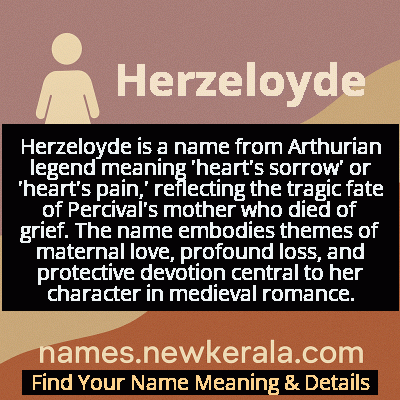Herzeloyde Name Meaning & Details
Origin, Popularity, Numerology Analysis & Name Meaning of Herzeloyde
Discover the origin, meaning, and cultural significance of the name HERZELOYDE. Delve into its historical roots and explore the lasting impact it has had on communities and traditions.
Name
Herzeloyde
Gender
Female
Origin
Arthurian
Lucky Number
6
Meaning of the Name - Herzeloyde
Herzeloyde is a name from Arthurian legend meaning 'heart's sorrow' or 'heart's pain,' reflecting the tragic fate of Percival's mother who died of grief. The name embodies themes of maternal love, profound loss, and protective devotion central to her character in medieval romance.
Herzeloyde - Complete Numerology Analysis
Your Numerology Number
Based on Pythagorean Numerology System
Ruling Planet
Venus
Positive Nature
Harmonious, responsible, caring, and artistic.
Negative Traits
Overly idealistic, superficial, possessive, or jealous.
Lucky Colours
Pink, turquoise.
Lucky Days
Friday.
Lucky Stones
Diamond, turquoise.
Harmony Numbers
2, 3, 9.
Best Suited Professions
Artists, musicians, teachers, healthcare workers.
What People Like About You
Warmth, nurturing nature, artistic flair.
Famous People Named Herzeloyde
Herzeloyde
Arthurian Queen
Mother of Percival and central tragic figure in Grail romance traditions
Herzeloyde (Literary)
Literary Character
Complex maternal figure in Wolfram von Eschenbach's medieval epic Parzival
Herzeloyde (Operatic)
Opera Character
Influential offstage presence in Wagner's Parsifal representing maternal sacrifice
Name Variations & International Equivalents
Click on blue names to explore their detailed meanings. Gray names with will be available soon.
Cultural & Historical Significance
Beyond her immediate narrative function, Herzeloyde's cultural significance extends to her representation of female agency in medieval literature. Unlike many passive female characters in Arthurian romance, she takes decisive action to shape her son's upbringing and destiny, even if her methods are ultimately unsuccessful. Her death from heartbreak when Percival leaves to become a knight completes her tragic arc and establishes her as a symbol of the inevitable separation between parents and children. This character has influenced countless adaptations of the Percival story across European literature and continues to be studied as an important example of how medieval authors explored complex emotional and psychological themes through female characters.
Extended Personality Analysis
Herzeloyde's personality is defined by profound emotional depth, fierce maternal devotion, and tragic nobility shaped by overwhelming loss. Her character demonstrates how grief can transform into determined protection, as she channels the pain of her husband's death into creating a sheltered environment for her son. This creates a woman of intense contradictions—simultaneously broken by sorrow yet remarkably strong in her convictions. Her intelligence and strategic thinking are evident in how she carefully controls Percival's upbringing, ensuring he develops physical strength and noble character while remaining ignorant of the chivalric world that destroyed her happiness.
Beneath her protective exterior lies deep emotional complexity and psychological insight. Herzeloyde understands human nature and the corrupting influences of courtly society, making her isolationist approach both understandable and tragic. Her love for Percival is absolute but manifests as controlling behavior that ultimately cannot prevent his destiny. This tension between her protective instincts and her son's inevitable path creates one of the most psychologically rich maternal portraits in medieval literature. Her final act—dying of a broken heart when Percival leaves—demonstrates the depth of her emotional connection and the ultimate sacrifice of maternal love, making her a timeless representation of how love and loss are inextricably linked in the human experience.
Modern Usage & Popularity
In contemporary contexts, Herzeloyde remains an exceptionally rare name used almost exclusively within academic, literary, and Arthurian enthusiast circles rather than as a practical given name. Its usage is limited to historical fiction, fantasy literature inspired by medieval themes, and occasional artistic or literary references. The name has never gained popularity in modern naming trends due to its archaic Germanic structure, strong association with tragedy, and linguistic complexity that makes it challenging for everyday use. However, it occasionally appears in creative contexts where authors or parents seek names with deep literary heritage and emotional resonance. Some modern interpretations have attempted to reframe Herzeloyde by emphasizing her strength and devotion rather than focusing solely on her sorrow, though this has not significantly increased the name's practical usage.
Symbolic & Spiritual Meanings
Herzeloyde serves as a powerful symbol of the inseparable connection between profound love and inevitable loss, representing how the deepest affections carry the risk of the most devastating grief. Her name, meaning 'heart's sorrow,' makes her a literal embodiment of emotional pain transformed into protective strength. She symbolizes the archetypal grieving mother who channels personal tragedy into determined action, illustrating how heartbreak can shape parenting approaches and family dynamics. Her story serves as a metaphor for the universal parental dilemma of wanting to protect children from life's dangers while recognizing their need for independence and self-discovery.
Beyond her immediate narrative, Herzeloyde represents the tension between isolation and engagement with the world. Her retreat to the forest symbolizes the human desire to create safe havens away from society's dangers, while her son's inevitable departure demonstrates the futility of completely shielding loved ones from life's challenges. She embodies the painful truth that genuine love sometimes requires letting go, even when it causes heartbreak. Her character also symbolizes the often-invisible emotional labor of women in heroic narratives, serving as a reminder that behind every knight's quest lies a network of relationships, sacrifices, and emotional costs that enable his journey but are rarely celebrated in the traditional heroic canon.

